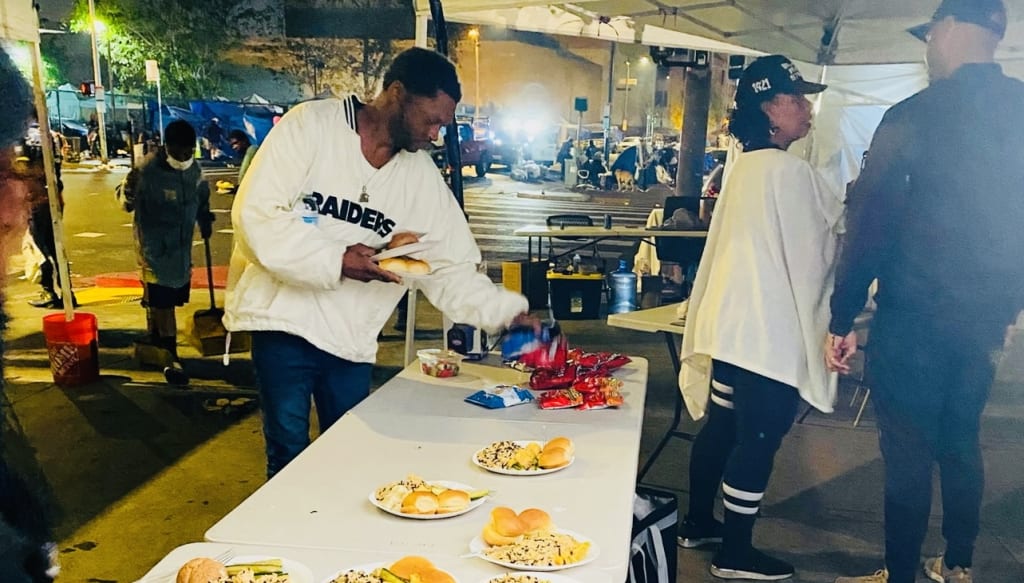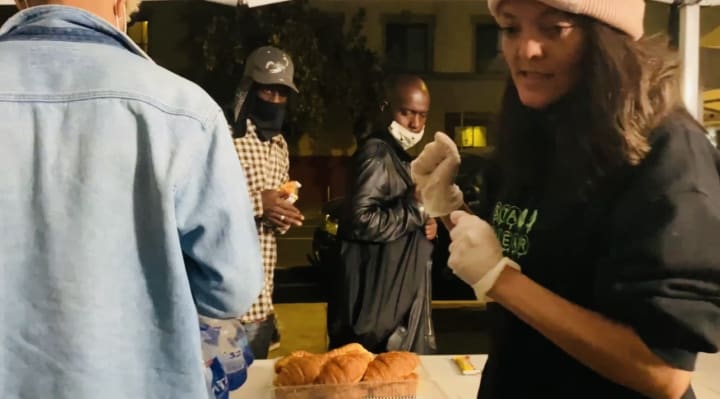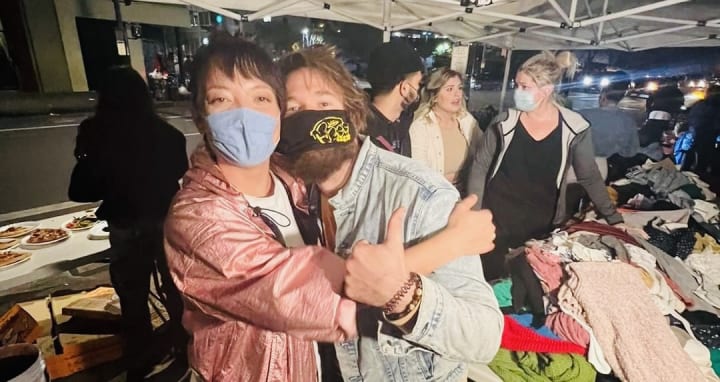Why I Miss Going to Skid Row
& Why It's The Heartbeat of Modern Human Existence

On Tuesdays, when I’m at home in Los Angeles, I make my way to the shoot of a major motion picture or television series. I drive to the Sony lot in Culver City, or to the set of Euphoria in Hollywood, or to Santa Clarita Studios where they film Good Trouble, just down the road from Six Flags. I rendezvous with production assistants, security guards, and caterers.
I don’t stop to see whose names are on the trailer doors. I don’t check to see if Adam Sandler is parked in his space at Sony Pictures. I don’t wander off for a peek at The Goldbergs’ set. I’m not a Hollywood nerd or a wannabe actor (not anymore, anyway). I do my job and let them do theirs.
My job is to collect food. All the leftover catered food that the actors and technicians and assistants and directors didn’t consume on that particular film day. Sandwiches, salads and cookies. Trays of grilled fish and rice. Chicken breasts still steaming under aluminum foil. Beef and veggie skewers. Noodles. Pineapple salsa. Green beans with sliced almonds. Bread rolls. Mashed potatoes. Steamed carrots with butter and parsley. Pesto tortellini. Fajita steak. Meatloaf. Vegan curry. It’s different every time.
Sometimes it’s a lot of food. Sometimes it’s not much at all. Sometimes I do two set runs in one afternoon. I take my orders from Every Day Action, a small LA-based nonprofit that works with Hollywood productions to reduce food waste and feed the hungry.
There are a great deal of underfed people in Los Angeles. According to a pre-pandemic LA Food Bank statistic: 1 in every 5 Angelenos is food insecure, or about 2 million people. Post COVID-19 pandemic, they now estimate it to be 1 in 4.
I have taken food to shelters and community groups all over town. On Tuesdays, I go to the corner of 6th Street and San Pedro downtown, the middle of a three-block stretch of housing projects, sidewalk tents, and street dwellers: Skid Row.
This is where #FeedSkid takes place, every Tuesday. A group of us park as close as possible and set up around 6pm, under white tents, behind fold out tables. An amp is plugged in to a generator and hooked up to a mic. Old school hip hop and pop jams crank into the street. People line the bike lane of 6th street, waiting for their plate. We divvy up the food onto flimsy paper rounds with dollar-store tongs and crown them with plastic forks. Usually by 6:15, someone has arrived with a stack of Hot ’N Ready pizzas. A second row of tables holds clothing donations for people to pick through. Sometimes there are waters or juice boxes. Sometimes there are extra snacks. Sometimes Tiffany from Crafting Change in Portland brings 70 backpacks with soap in a knitted pouch, water, masks and cereal bars. Sometimes I receive a $100 Venmo to spend on Feed Skid supplies and show up with fruit, cheese, bulk socks, and adult diapers. Sometimes we have a turkey or homemade chili. Sometimes it’s as bare bones as it gets - a few sad pizza slices, no extras.
I work with a roster of young folks who come whenever they can make it. Actors, models, influencers, outreach pros. People hustle from their gigs/jobs and everyone pitches in until all the food and clothes are gone. We break down the pizza boxes and someone volunteers to clean the ladles and tongs for the following week. It goes by fast.

I don’t know why I suddenly became interested in the homeless and hungry of LA. I have planted trees and read with kids, sponsored villages in India and picked up trash on the beach, but I never gave much to “vagrants.” I would sometimes give food or a passing smile if it was convenient for me. I have witnessed the homeless struggle in Vancouver, New York, San Francisco, Honolulu, Seattle, San Diego, and Los Angeles for decades, generally ignoring its inconvenience and moving on with my own problems. Questions might tickle my thoughts occasionally:
Whose fault is it that they are homeless? Is it a choice?
What would it be like if I were homeless? Where would I go?
Does it all stem from drugs? Mental illness?
Does giving money help or hurt in the long run?
What is the best way to give?
I never googled the answers—I figured they were too complicated to solve in a passing scroll. Which is true.
I never engaged meaningfully with someone who might know how to answer. Which is sad, because the questions never went away.
I took care not to resent or worry about the homeless people I passed. I remembered that it wasn’t above me to sleep on the floor of an airport or a dark corner of a long rehearsal day. If I had nowhere else to go, I suppose the sidewalk would have to do.
But what if it rains?
Don’t think about it.
Fast forward to the first year of the pandemic. I am mentally exhausted but the world keeps flooding in with no end. All the things I had decided not to think about because they are uncomfortable and unclear suddenly seem like the most obvious things to solve. We need respect for Black women. We need antiracist policy. We need to amplify Indigenous voices. We need anti-violence education and support for Black LGBTQ+ folks. We need health care for everyone and better pay for health workers/educators. We need an equitable justice system.
We need homes and services for the homeless.
It’s hard to understand why we need to house the unhoused at first. I mean, how could it make sense to give someone, for free, what the rest of us work so hard to provide for ourselves? I have worked my whole life to avoid getting fired, being an addict, and mismanaging money, all to afford a bed under a roof, electricity, a phone, and a fridge full of hippie food.
The thing is... I have been lucky in so many ways. Lucky to be born in a country providing free health care and social services. Lucky to be mostly sheltered from the racism suffered by my darker-skinned friends. Lucky to have had a good upbringing that set me up for mental stability, easy education, and the ability to work without crushing my own soul.
"Luck" and "privilege" are not talked about in a capitalist economy as much as "hard work" is.
Simply giving someone else what I had to work hard for hurts. Mostly because I feel dumb for working so hard in a system that only rewards me with more work. So, to validate my work and my choices, I withhold my generosity to “teach the less fortunate a lesson,” perpetuating the system that keeps people homeless, exhausted, and uncared for. “But what about me?” This is the question in the hearts of every single person in a capitalist economy. All of us, wandering around, wondering if we have what it takes to survive, to do better than the guy next to us. Instead of stopping to wonder why we can't take care of every single citizen at a bare minimum before we subject them to the ruthless economic machine.
I learned from a basic orientation with LA Family Housing (LAFH) that the number one cause of homelessness is local housing cost. It is a proven, direct correlation. Far above any proof of correlation with mental illness or drug addiction. Shelter is profit-driven just like everything else in America, and where it is most expensive is where you’ll find the most street sleepers and park dwellers.
At an LAFH facility in North Hollywood, I did some light food prep and served lunch to a small group of polite shelter residents. They were allowed one plate of half decent food and unlimited juice. No dietary restrictions were considered and everything was fairly oil and salt heavy. On Wednesdays we’d get trays of free donuts. The juice came from a bulk powder pack dissolved in a few gallons of water. I read the ingredients once: high fructose corn syrup, fake flavor, and dyes. Cancer and diabetes in bold colors. The kitchen lead told me I could “put less water in than the instructions say.” A lot of people skipped the lunch and came back, again and again, for more juice. “Less ice, please.” “Could you fill this bottle?” I shifted from foot to foot in my hairnet, apron and latex gloves, realizing that the simplest, most healthy food choices are a privilege. We are not fed or educated equally on how to nourish our bodies.
I still donate monthly to LAFH. They provide full service solutions for families experiencing homelessness, and I believe their intentions are good. It's not their fault that the most accessible drink options are secretly addictive poison. The staff were all super friendly, organized and helpful. It just felt like people cared, from the top down. I volunteer with Every Day Action and Feed Skid (organized by Active Advocate) now because it feels most impactful. If no one shows up to serve in the LAFH cafeteria, the paid staff just do it and it’s no big deal. If there’s no one to pick up the food from set, the food goes to waste and more people go hungry. I throw on my powder blue vest and put my car to work.
Which brings me back to Feed Skid. A completely people-funded, grassroots effort to give as many people on Skid Row as possible a meal and a smile, one day of the week. A hot meal on a flimsy plate set to fire throwback beats. People smile back at us. They dance on the street corner. They let their puppies run around our feet. They make suggestions and sweet comments. Occasionally they try to skip the line or get seconds. We try to accommodate whatever people need and roll with the mood of the crowd. We relish giving out extra treats and necessities and power through the tougher moments, like not having enough. It all fuels us for the following week.
I’ve been away from LA for over a month, and I miss my Tuesday ritual. It’s an hour-long slog both ways through rush hour traffic to and from downtown, for only 30-40 minutes of actual work. Still, I crave it.
Helping Skid Row, I realize now, illuminates every human issue on the planet. It is a place for the forgotten and the ignored. In it, you will find the victims of racial injustice, xenophobia, extreme poverty, mental illness, addiction, homophobia/transphobia, and every type of abuse. You will also find compassion, courtesy, laughter, music, honest conversations, resilience, humble kids and their parents.
You could learn everything you wanted to learn about life from Skid Row.
You could see how people of color are disproportionately affected by poverty and policing.
You could see the full spectrum of mental health, from calm, patient knowing to untreated traumas and the occasional lashing out. In survival mode, mental stability is no longer a flowing, contained river but a boiling kettle.
You could witness the chaos, the shadows, the failings, and the still-prevailing light of humanity.
You could feel both helpful and helped, in a genuine way that you might not be able to explain.
You could learn about the fear, the injustice, and the misrepresentation of the less-privileged in this country. See the effects of late-stage capitalism and “what about me?” culture in real time.
And you could see the way that greedy corporations have rooted deeply into our acts of service. Cheap pizza. Cheap plates. Cheap socks. Sodas and snacks with cheap ingredients. Tons of plastic and paper waste. The careless choices of corporate CEO’s filter down and fill the streets with everlasting garbage, fill the veins of the city’s poorest with crap sugars and chemicals. Then turn around and sell sustainable products and pure foods to the wealthy class. Market their 0.3% profit share with some strategic "community" fund for better metrics.
Do I know how to fix any of this?
No.
But I’m going to spend more time figuring it out and doing my best. I'm going to listen to the stories and voices of Skid Row. And while I’m observing and learning from the people and policies around me, I will shuttle the leftover kindness, divvy up all the generosity I find and pass it out on paper plates to those who need it most.
If you want to know the real Los Angeles, the real West Coast, the real America…
If you want to put your dollars, your vehicle, your able body, or your smile to good use…
If you want to learn about the world through actual people, not just catchy digital squares…
If you want to make a difference in someone’s day, by bringing quality food to someone who doesn’t always eat…
…come to Skid Row on Tuesdays.

Please consider donating weekly to #FeedSkid via @activeadvocate
DM @activeadvocate on IG to sign up for #FeedSkid and get more details
Every Day Action needs “Radical Reallocators” (drivers) to pick up food from various set locations in LA County and drop them off where they are needed most. Scheduling is flexible and food runs take a couple of hours tops. Contact Hillary at [email protected] for volunteer information, or to donate food/clothing.
LA Family Housing needs volunteers for a vast range of activities every week across many locations. They make it easy to sign up, go through orientation, and pick up/swap shifts with ease. They also accept monthly donations, or you can send basic essentials like soap, toilet paper, shampoo, socks, etc. Everything helps. :)
Don’t live in LA? Feel free to comment your favorite local volunteer organization(s) or ways to help in your own community.
About the Creator
Enjoyed the story? Support the Creator.
Subscribe for free to receive all their stories in your feed. You could also pledge your support or give them a one-off tip, letting them know you appreciate their work.






Comments
There are no comments for this story
Be the first to respond and start the conversation.